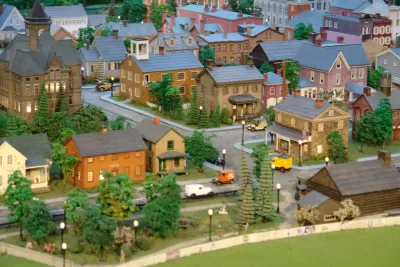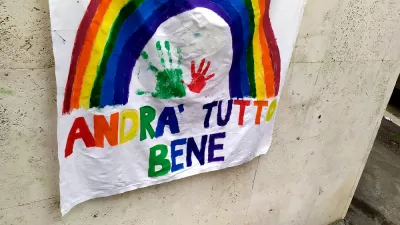In the same vein that Robert Putnam explored decaying community and social capital in American in his work, Bowling Alone, Brian Bethune discusses how the decay of Western communities shapes our health and political realms.

As Brian Bethune reports in Maclean's, many studies have shown we are disconnected with our neighbors more and more. Indeed, "more than 30 per cent of Canadians now say they feel disconnected from their neighbours, while half of Americans admit they don’t know the names of theirs. A recent poll of 2,000 Britons found a third declaring they couldn’t pick their near neighbours out of a police lineup."
This lack of neighborhood is detrimental for our health, according to Susan Pinker, citing research that shows how quality face-to-face contact "fortifies immune systems, calibrates hormones and increases chances of surviving heart attacks, strokes, AIDS and cancer." With this neighborly disconnect the "modern definition of a good neighbour is no longer someone who is part of your life, someone you chat with over the fence, a reliable shoulder in good times and bad, but someone who doesn’t bother you, either in your enjoyment of your home or by threatening its property value", comments Bethune.
Bethune goes on to discuss how American neighborhoods are now homogenized "not by ethnicity but by income, lifestyle and, above all, attitude," and Canadian neighborhoods more and more reflect political party lines, especially in urban areas.
FULL STORY: The end of neighbours

Planetizen Federal Action Tracker
A weekly monitor of how Trump’s orders and actions are impacting planners and planning in America.

Maui's Vacation Rental Debate Turns Ugly
Verbal attacks, misinformation campaigns and fistfights plague a high-stakes debate to convert thousands of vacation rentals into long-term housing.

Restaurant Patios Were a Pandemic Win — Why Were They so Hard to Keep?
Social distancing requirements and changes in travel patterns prompted cities to pilot new uses for street and sidewalk space. Then it got complicated.

In California Battle of Housing vs. Environment, Housing Just Won
A new state law significantly limits the power of CEQA, an environmental review law that served as a powerful tool for blocking new development.

Boulder Eliminates Parking Minimums Citywide
Officials estimate the cost of building a single underground parking space at up to $100,000.

Orange County, Florida Adopts Largest US “Sprawl Repair” Code
The ‘Orange Code’ seeks to rectify decades of sprawl-inducing, car-oriented development.
Urban Design for Planners 1: Software Tools
This six-course series explores essential urban design concepts using open source software and equips planners with the tools they need to participate fully in the urban design process.
Planning for Universal Design
Learn the tools for implementing Universal Design in planning regulations.
Heyer Gruel & Associates PA
JM Goldson LLC
Custer County Colorado
City of Camden Redevelopment Agency
City of Astoria
Transportation Research & Education Center (TREC) at Portland State University
Jefferson Parish Government
Camden Redevelopment Agency
City of Claremont



























